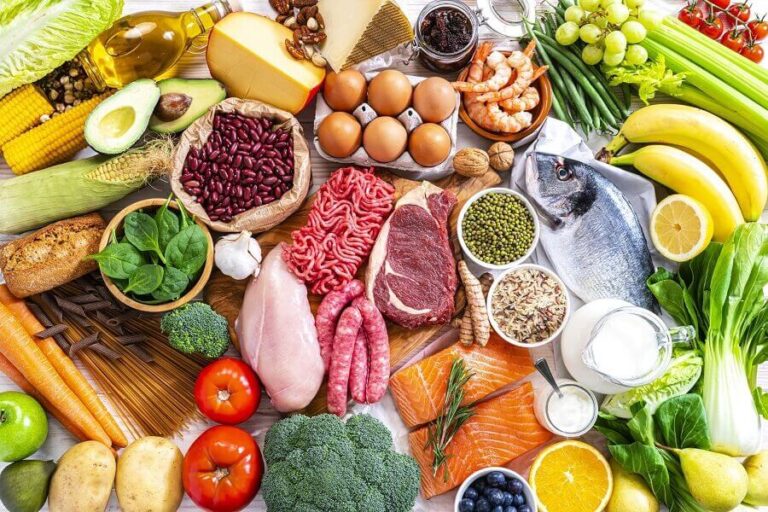Eggs are one of the most controversial foods these days. We all know that the egg is a food rich in protein . However, there are still several myths about its nutrients.
That the egg is high in calories, that it has a lot of bad cholesterol and that if you are going to eat eggs every day, you should eat only the protein in the white.
To get rid of your doubts, this article describes the properties of the egg: its amount of protein, calories and nutrients. How many eggs to eat a day?
RELATED: How Many Eggs Can You Eat Per Day?
Egg protein, calories and nutrients
A large hard-boiled egg weighs about 50 grams and contains about 65 calories. So you could say that it is a low calorie food.
The amount of protein in an average egg is 6 grams. (6) And these are in the clearing.
About 5 g correspond to fats of which 1.9 are monounsaturated and 1.5 g are saturated. And they are found in the yolk. The carbohydrate content of the egg is approximately 1 g.
In addition, an egg provides a high content of micronutrients: potassium, vitamin A, vitamin B12 and zinc.
The nutritional properties of 1 cooked white egg (8) are described below:
| Calories | 65 | Kcal |
| Protein | 6 | g |
| Total fat | 5 | g |
| Carbohydrates | 1 | g |
| Total fiber | 0 | g |
| Total sugars | 0.2 | g |
| Football | 35 | mg |
| Iron | 1.59 | mg |
| Potassium | 150 | mg |
| Sodium | 195 | mg |
| Zinc | 1.06 | mg |
| Vitamin B-6 | 0.1 | mg |
| Vitamin B-12 | 0.5 | µg |
| Vitamin A | 885 | IU |
| Vitamin D | 53 | IU |
| Cholesterol | 411 | mg |
Table of nutrients for 1 white egg. Source: USDA (8)
RELATED:
- Proteins – Importance, benefits and amount per day
- Carbohydrates, proteins and fats – The ideal percentage in nutrition
- How to boil eggs correctly?
Amino Acid Profile of Egg Protein
Egg protein is known as albumin or ovalbumin. A protein of high biological value . This means that it is highly assimilated and its essential amino acid profile is complete. For this reason, it is one of the most recommended proteins in sports nutrition.
The amino acid profile of egg protein is described below:
- Leucina 523 mg
- Lysine 445 mg
- Fenilalanina 328 mg
- Tyrosine 249 mg
- Cystine 208 mg
- Metionina 195 mg
- Treonina 294 mg
- Tryptophan 117 mg
- Valina 413 mg
- Total Essential Amino Acids 3103 mg
How many eggs to eat a day?
The amount of eggs you should eat per day depends on your level of physical activity, as well as the rest of the combination of foods that you include in your diet.
For an average person, it is recommended not to eat more than 7 eggs per week or 1 per day. (5)
Although, if for example you carry out a vegetarian diet, you may need more protein. In these cases you can eat up to 3 eggs per day.
In addition, people who do bodybuilding or high performance athletes may need up to 2.0 grams of protein per body kilogram per day. The equivalent of 140 grams of protein per day.
Assuming there is no other source of protein than eggs, to increase muscle mass, a 70 kg man should eat 23 egg whites per day.
RELATED: Egg Fast – What is it?
What is better the white or the yolk?
Another myth about eating eggs is the fact that the white is better than the yolk.
Although it is true that most of the egg proteins are found in the white, by removing the yolk you would be eliminating a large part of other nutrients.
Protein is not the only thing that the egg provides. The yolk is rich in fat soluble vitamins such as vitamin A, vitamin D and vitamin E . These vitamins are essential nutrients for the body.
In addition, the color of the egg yolk is due to the presence of antioxidants such as lutein and zeaxanthin. Molecules with antioxidant properties and useful nutrients to combat free radical oxidation.
Is raw egg bad for the liver?
The egg should always be eaten cooked. Eating raw egg is not only an overload for the digestive system, you will not get more protein or nutrients and you are at risk of infections by viruses and bacteria such as salmonellosis.
In addition, it is always recommended to wash its shell with hot water before cooking. Besides raw, the other way to avoid eating eggs is fried egg. Fried foods are high in fat and have a trans fat content of up to 3%.
Consuming these types of fats is associated with an increased risk of cardiovascular disease. (7)
RELATED: Is Eating Lots of Eggs Bad for Fatty Liver?
Which Eggs Have the Most Nutrients and Proteins?
In terms of nutrients, not all eggs are the same.
The amount of protein in white eggs is slightly more than red eggs. In addition, the way in which the hens are fed directly affects the nutritional properties of the egg.
In most industrial farms. The hens are practically immobilized, a fact that directly influences the fatty acid balance of the egg. (1)
To buy high-quality eggs, we recommend those that come from free-range or organic chickens. Eggs as well as other organic foods tend to have a higher content of vitamins and minerals in their composition.
To find out if an egg is fresh or not you can do a simple test with water. If the egg sinks it means that the egg is fresh. If it floats, better not eat them.
ABSTRACT
Eggs are a food rich in nutrients, proteins, vitamins and minerals.
The amount of protein in an egg is 6 g. It is low in carbohydrates and relatively low in calories.
While the recommendations for how many eggs to eat per day may vary from person to person, for the average one egg a day is sufficient.
Vegetarians or people who exercise can eat 3 to 6 eggs per day. In these cases, it may be necessary to remove some yolks to avoid overdoing it with the amount of fat needed per day.
Making a direct relationship between bad cholesterol levels and egg consumption is a mistake. In fact, eating 3 eggs a day increases good cholesterol levels.
The egg is a food that should always be eaten, always cooked. Eating raw eggs can cause digestion problems as well as increase the risk of bacterial infections.
Not all eggs are of the same quality, their protein and nutrient content may vary. The best are eggs of organic origin or from free range chickens.







